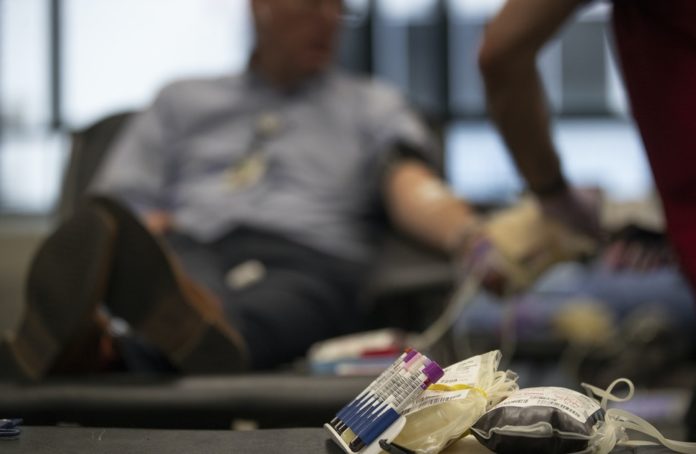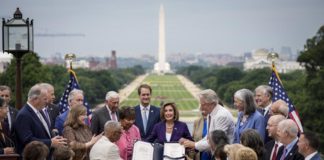
Thanks to the Star Tribune Editorial Board for urging more people to donate blood (“More of us need to donate blood,” editorial, Aug. 31). I started making regular blood donations during last year’s COVID lockdown as a way to help during a very helpless-feeling time.
Then, by chance, my 19-year-old son was diagnosed with a serious bone marrow disorder this June and has had many blood and platelet transfusions since then to keep him alive while we are waiting for his bone marrow transplant. Every time he gets a transfusion, we look at the bag of lifesaving blood or platelets and feel so incredibly thankful to the kind donors who gave of themselves, quite literally.
It is very easy to donate and one blood donation can save up to three lives. A huge thank you to all the amazing blood donors.
Char Mason, St. Paul
•••
The Star Tribune’s Aug. 31 editorial calling for more of us to take the simple and lifesaving step of donating blood was timely and appreciated. There is one group made up of tens of thousands of Americans who would readily heed this call but are legally barred from doing so under certain circumstances: gay and bisexual men. In the U.S., men who have had sex with other men any time in the past three months cannot donate blood (this was changed from anytime in the past 12 months during the pandemic). This is true even if the man in question is in a monogamous, long-term relationship or marriage. Think of your gay friends whose wedding you went to a couple of years ago: The government says they are too dangerous to participate in the neighborhood blood drive. But a straight person, regardless of how many sexual partners they have had in just the past month, is more than welcome to roll up their sleeve.
This is despite rigorous testing of all donated blood for any sexually transmitted diseases, including HIV.
Lives literally depend on ending this discriminatory practice.
Tane Danger, Minneapolis
•••
The blood-donation editorial was not quite complete. Two places to donate: the Red Cross (612-871-7676) and Memorial Blood Centers (888-448-3253). Call and get the closest donation locations. Donors are needed for whole blood, platelets, plasma and double red cell — all blood types. O-negative is the universal type that any person can receive. Minimum age to donate is 16, with no end age. Call for restrictions regarding medicines, place of birth, health history issues, etc.
As an 85-year-old, I’m blessed with having donated 43 gallons … and I’m not done yet. It is the most rewarding thing I’ve done in my lifetime. Doesn’t hurt. Great staff. Takes about 1.5 hours. You can watch TV or a movie. They bring water, sodas and cookies. Chairs are fabulous and relaxing. And you can help up to three people with one donation by truly “giving forward.” A true miracle for donor and receiver.
Barbara Nylen, Minneapolis
CLIMATE SCIENCE
In Aug. 30’s paper, “Katie Tubb” from “the Heritage Foundation” claims that “the science” of climate change isn’t really much to worry about. Note that putting quotations around her name and organization do not invalidate them any more than her constant use of quotations around the words “the science” changes its validity (“Concerns continue to be overheated,” Opinion Exchange).
Tubb actually uses Galileo, Kepler and Copernicus to argue that since science changes, you shouldn’t believe what it says. But those heroes of science didn’t reject previous scientific knowledge; their innovation was that our understanding of the world should be based on evidence. Before them, Europe based such knowledge on the philosopher Aristotle, whose ideas were supported by the powerful hierarchy of the Catholic Church. The Church wanted all knowledge to be derived from its own beliefs and was threatened by knowledge that could be proven through science.
In this context, it is important to point out that the Heritage Foundation is not a scientific group. It is a political group, dedicated to protecting those at the top of today’s hierarchy from the threats of fair taxes and government action that could lessen their wealth. It is more the heir of the Church that persecuted Galileo, Kepler and Copernicus than a protector of their scientific revolution.
One misleading statement in this piece is that warming since 1850 is “only” 1.1 degrees Celsius, so we don’t need to worry. But the difference in world temperature between when we were covered here by a mile of ice and when we were ice-free was only a few degrees Celsius. The numbers are small, but the effects can be huge.
But the most misleading part of Tubb’s piece was her repeated mention of the huge costs of acting against climate change. This is a favorite argument against needed action but is clearly not supported by evidence. Wind energy and solar panels are usually the cheapest available source of new electricity. Electric cars might cost more up front but cost their owner less over time because of lower maintenance and fuel costs. Efficiency in buildings saves money. Even changes reducing agriculture’s emissions usually save farmers money by decreasing costs for irrigation, fertilization and other inputs.
Even more misleading on costs is the lack of any mention of the costs of inaction. We are already seeing huge costs to our nation from wildfires, drought-caused crop failures, flash flooding and deaths caused by extreme heat. While the costs of the solutions have been coming down over time and will likely continue to do so with mass production and innovation, the costs of inaction will just keep going up as long as we refuse to solve the problem.
The effect of CO2 on climate has been known for 150 years. The basic science is clear and agreed upon by scientists. There are always improvements to our scientific knowledge, but those will not change the evidence or the main conclusions based on it. Insisting we wait to act until all the questions are answered is just a delaying tactic. The time for action is now!
Michael Schwartz, St. Louis Park
•••
How does a conservative policy analyst call for “scientific humility” on climate change just as unexpected flooding has killed dozens in Tennessee, a supercharged hurricane has knocked out power in New Orleans and wildfires threaten homes and recreation from California to Minnesota? Is it time for humility or a realistic look at the cost of inaction vs. action on climate?
Since 1980, the U.S. has sustained 298 weather and climate disasters where overall damages/costs reached or exceeded $1 billion. The total cost of these 298 events exceeds $1.975 trillion, according to the National Oceanic and Atmospheric Administration. Climate change is increasing the frequency of extremes that lead to billion-dollar disasters (from the 2018 U.S. National Climate Assessment, chapter 2). Inaction is costly.
Air pollution from burning fossil fuels is responsible for hundreds of thousands of deaths annually in the U.S. Smoke from last year’s wildfires in California, Oregon and Washington also contributed to a significant increase in COVID-19 cases and deaths in those states, according to a study in Science Advances from August. Climate change has been a key factor in increasing the risk and extent of wildfires in the western United States. Inaction kills people.
Fortunately, there is a solution that can reduce the existing costs of climate change while creating jobs and putting money in peoples’ pockets. There are several bills in Congress calling for a rising fee on fossil fuels with a regular rebate to households of the new revenue. A carbon tax is a conservative, free-market solution that helps people, protects U.S. businesses and reduces greenhouse gases that contribute to climate disasters.
Maybe it is time for a humble look at past conservative wisdom.
Claudia Egelhoff, West St. Paul
We want to hear from you. Send us your thoughts here.







